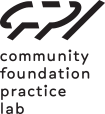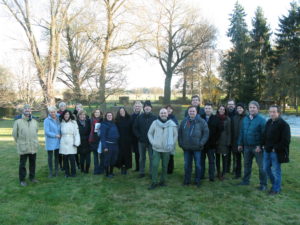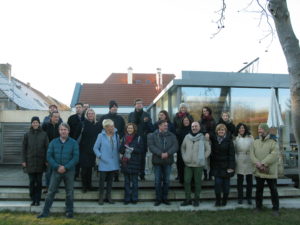The European Community Foundation Initiative’s (ECFI) first Thematic Meeting was held on November 14-15, 2016 in an inspirational setting of the Stiftungs Academy in Paretz near Berlin with 22 participants from 16 European CF Support Organizations .
The topic of the Thematic Meeting was “Community Foundation Support Organizations in Europe: Status, Needs and Opportunities”.
The meeting was conceived as an opportunity to deepen ECFI’s interaction with CF Support organizations across Europe. All known active CFSOs in Europe were invited as well as – for those countries where no support organization currently exists – CFs or other organizations with an interest in supporting the expansion of CFs in their countries.
The aims of the meeting were to:
- Improve understanding of CFSO landscape
- Identify common challenges & learning needs & interest for follow-up
- Strengthen relationships among CFSOs in Europe
The Thematic Meeting went according to the enclosed agenda and the summary of the meetings outcomes including presentations by guest experts is presented below.
=================================================
Prof. Burkhard Kuestermann (a member of the ECFI team) then presented the results of ECFI’s first survey of CFSOs in Europe (here). Among other data, this presentation captured the challenges and needs of CFs and CFSOs as expressed over the course of 2016 by CFSOs attending the meeting and those that had not be able to attend. In terms of how ECFI could support CFSOs, the responses can be summarized as follows (please see the presentation for full set of points.:
- peer learning
- exchange of ideas
- a network of CFs
- access to partners throughout Europe
- connect peers in Europe
- facilitate training activities, master classes
- international projects on identified topics/needs
- raise money from EU or other international sources
HOW COULD THE NEEDS OF EUROPEAN CFS/CFSOS BE MET?
In the small group session that followed, participants were asked to provide input on what specifically might be done to address the needs identified across multiple countries. They were asked to come up with practical suggestions that they, together with ECFI, could pursue to address the needs. Participants were asked to join the group they had most interest in discussing.
1: POLITICS/CONTEXT
Needs: To learn and understand what we can do in the context of shrinking space for civil society; operating/developing in a hostile environment; Discussion on what a CF is on a national level with field activists; Reformulate/rethink our work in the context of changing politics and reality of increased divisiveness (focus on young people!); Need to support civil society groups and associations, especially small ones; Encourage and provide options for CFSO and CFs to go/think beyond the local.
There was also some discussion in the large group of Vital Signs and the role of CFs vis a vis politics given that issues in communities often have political dimensions. While some felt that CFs should not take political issues forward proactively, they felt a CF can work with NGOs that work with those issues, thus helping to place them on the agenda and raise community awareness about the issue. At the same time, they felt the foundation itself should not be an activist. Others felt that it is difficult to remain neutral, especially in challenging political times, or that sometimes a particular political agenda gets ascribed to CFs even if they seek to avoid being political. One response offered in terms of the use of Vital Signs was simply to present the figures, without commenting on whether the data indicates that it is too much or little is being done, and focusing on having a well-attended, multi-perspective community discussion follow.
The large group discussion of these ideas resulted in considerable enthusiasm for the idea of a European Vital Signs initiative. A number of people indicated having interest in pursuing this idea further.
2: FUNDRAISING.
Challenges: Find long-term or new partners to support operational costs and core work; fundraising locally in huge economic crisis (54% unemployment in B&H); Legislative restrictions (affecting grantmaking); No tax incentives for business donations (Georgia, Serbia, Slovakia, Italy, Croatia); Legacy tax; Business want sole ownership of projects when giving funds
Needs: Need for grantmaking funds; engaging diaspora communities
3: CF MODEL AND VALUE PROPOSITION.
Lessons: Building trust with people takes time; Only one model (endowment) is actively promoted; Open approach of CFs leads to difficulties in making results tangible; Having a specific target (audience or issue) may help build public understanding and trust in CFs; Having an impact evaluation tool for CFs is important; Sustainability of networks is fragile
Challenges: There is no standard model; Explaining what a CF is/does; Gap between citizens & groups working for citizens (trust lacking); Public perception (CFs linked to “marginal” human rights CSOs); Finding balance between being operative and grantmaking; Legal distinction between CFs and other types of organizations limited (means it is difficult to show difference) (espec. Croatia).
4: STRATEGIC COMMUNICATIONS
Lessons: Model promoted from outside; It is good to have a brand to “sell” the concept; However, one model can be too restrictive for local context
Challenges: Govt and Donors don’t understand support organizations.
Needs: Promote our identity/image; Brand for CFs in Europe; Be able to tell our story; strategic communication = communicating the added value of the CF in the community (for example addressing challenging issues); need to convince EU and other large players; Impact evaluation tool for CFs; Information/Communications technology/ICT to facilitate the network.
==============================
PRESENTATION ON THE 4C FRAMEWORK FOR PHILANTHROPY SUPPORT ORGANIZATIONS.
This presentation by guest speaker Alina Porumb of ARC in Romania focused on the initial results of a WINGS and DAFNE peer learning group effort (which was itself based on earlier Infrastructure in Focus reports) to elaborate and test a framework for strategic thinking and the mapping of outcomes achieved by philanthropy support organizations. The 4C Framework stands for Capacity, Capability, Connections and Credibility, key areas where philanthropy organizations are felt to make a difference.
Alina also shared ARC’s analysis of how its outcome areas – many pre-dating the development of the 4Cs – could be related to the 4Cs framework. She explained that the very process of testing the framework had proven helpful for ARC both in better capturing the areas the organization seeks to impact and identifying where there were gaps in their previous outcome areas or indicators. Further case studies of this sort are in preparation. For a detailed look at the 4Cs and how ARC tested them, please see the full 4C_presentation.
In closing, she encouraged those interested in learning more or discussing how to use the framework themselves to get in touch with her. There will also be a session on the 4Cs at the WINGS Forum in Mexico in February 2017. People can a learn more through the Foundation Center website. Within the group, there appeared to be particular interest in the 4Cs from participants from Serbia, Ukraine, Bosnia & Herzegovina, Hungary and Germany.
EFFECTIVE DATA AND KNOWLEDGE MANAGEMENT FOR CF SUPPORT ORGANIZATIONS.
This session, led by guest speaker Larry McGill, Vice President of Knowledge Services at The Foundation Center in the US, outlined the data collection and knowledge sharing tools developed by the Foundation Center to support community foundations, other types of donors as well as grantseekers. These tools serve the multiple purposes of research, benchmarking, and offering knowledge platforms and data visualization tools.
While some of the tools are currently more oriented to the US, they are building their information on grantmaking by US foundations outside of the US and the grantmaking of non-US grantmakers. Many of the tools are accessible free of chanrge and a few require subscriptions. Larry emphasized that they are open to partnerships with organizations outside of Europe that are based on reciprocity. In other words, where organizations outside the US are willing to share their information, the Foundation Center will reduce or remove costs for access to agreed tools.
The tool that is most tailored to CFs is CF Insights. Glasspockets (with a focus on transparency) and GrantCraft were also presented, as well as Grant Space, Issue Lab and the Philanthropy News Digest.
Please see the full presentation or the Foundation Center website for more information on these tools.
Larry also emphasized the value proposition for these tools is the offering of market intelligence (i.e. who is working in specific thematic or geographical areas and how) and Monitoring and Learning (i.e. transactional, contextual and outcomes/impact data). He then led two short exercises with the group on the value proposition for contributing to joint data collection at a European level and on the principles for knowledge or data sharing.


